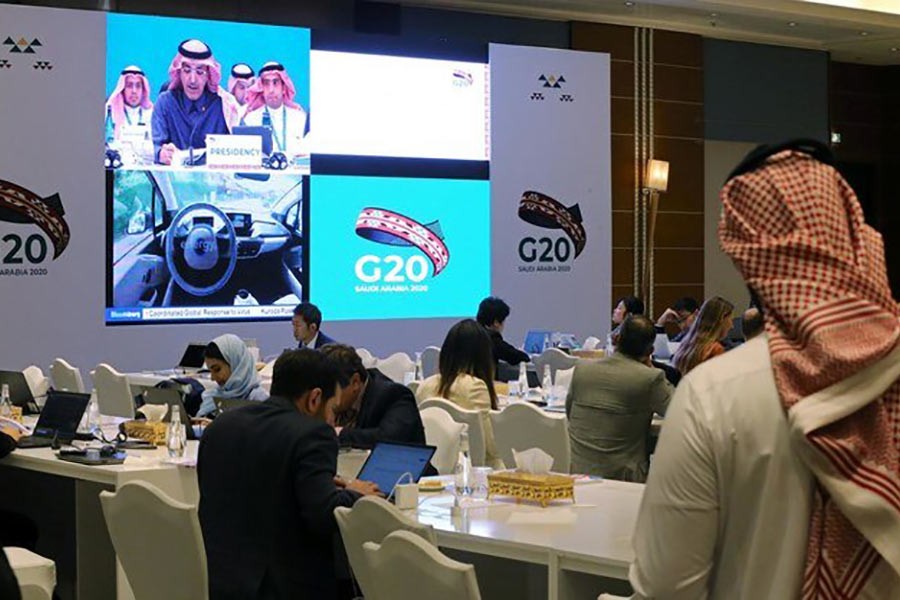Saudi Arabia, this year's chair of the Group of Twenty (G20), will convene a virtual summit this week to discuss a global response to the COVID-19 crisis. The emergency meeting could not come too soon. Because global health is a collective public good, any threat to it requires a multilateral response.
The health emergency also threatens to trigger a global recession and financial crisis. As we learned in 2008, global economic crises must also be met with a multilateral strategy. Timid, uncoordinated, or unilateral actions by individual countries will be ineffective, at best, and could lead to a downward spiral of "beggar-thy-neighbour" policies.
The G20 is the obvious candidate to play the role of global coordinator. Accounting for around 90 per cent of global GDP (gross domestic product), it comprises the world's largest advanced and emerging economies. And as a forum without a permanent secretariat, it is agile enough to bring the international community together quickly, as it did in November 2008, at the height of the financial crisis.
On that occasion, G20 leaders gathered in Washington, DC, to organise a coordinated response, and then met again in April 2009 in London, where they took steps to stabilise the global economy and restore confidence. It worked: a public display of collective leadership and shared responsibility averted a deeper economic collapse.
In today's emergency, the stakes are even higher, because millions of lives are in peril. Were COVID-19 to end up having a mortality rate of 1.0 per cent, the final death toll would be similar to that of World War II. Worse, that is the "benign" scenario. As of March 03, the World Health Organisation (WHO) put the current mortality rate at 3.4 per cent, based on reported cases.
In advanced economies, health-care systems facing an upsurge in COVID-19 cases are at risk of collapsing. In many developing countries, the medical infrastructure for dealing with infectious diseases is limited. Making matters worse, growing pressure on supply chains will make it more difficult to acquire basic goods, including medical equipment.
This is not a time for timid or symbolic action. The G20 urgently needs to adopt a plan for addressing the medical emergency, backstopping the global economy, and restoring confidence. What follows are suggestions - far from an exhaustive list - of the steps policymakers should take.
First, G20 leaders should embrace the principle of "virtuality" fully, by canceling the rest of the group's in-person meetings scheduled for this year. By moving online and avoiding unnecessary gatherings such as the Business 20 and other engagement groups, the G20 can set an example for all of those countries and communities that have yet to recognise the urgency of containment through "social distancing."
Second, the G20 should establish a fund to support the WHO's efforts to monitor and report on the emergency, and to coordinate the supply of basic equipment like testing kits and face masks. As in 2009, it is important to show the world that competent, skilled professionals are in the driver's seat.
Third, the G20 should give the WHO a formal seat at the table, as it has already done with the International Monetary Fund (IMF), the World Bank, and the OECD (Organisation for Economic Cooperation and Development). Global health has always been a secondary topic for the G20, which has tended to focus only on issues such as access to care and food and water safety. But as the current crisis shows, the systemic impact of pandemics and the influence of public health on economic conditions more broadly should be primary issues of concern.
Fourth, G20 member states must be prepared to help low-income countries that lack the infrastructure, medical provisions, expertise, and personnel to contain the contagion. Coordinated action among governments, regional development banks, the United Nations Development Programme (UNDP), and other entities is critical in this regard.
Fifth, the G20 should adopt an emergency package to prevent a full-scale collapse of the global economy. There is an urgent need for fiscal stimulus, measures to keep global supply chains operating, commitments to eschew protectionist measures and unilateral currency devaluation, and arrangements to ensure ample liquidity in the global monetary and financial system.
As in 2008 and its aftermath, the current crisis demands a comprehensive, "whatever it takes" approach, and it is needed now. Monetary policy in the absence of coordinated fiscal policies will have only a limited impact, and fiscal policies designed with only domestic considerations in mind will be far less powerful than they otherwise could have been, owing to the spillover effects of import spending. Research shows that the national-level impact of a coordinated G20-wide fiscal-stimulus package could be up to twice as large as that of domestic stimulus measures pursued in isolation. Moreover, unilateral measures could spook bond markets and thereby increase debt-servicing costs for countries such as Italy, which is in the grip of a full-blown medical emergency.
Above all, the G20 must be bold. The world has heard enough hollow declarations and tolerated enough puerile diplomatic quarrels. Judging from the figures coming out of China's Hubei province (the first epicentre of the pandemic) and northern Italy, the global outbreak will worsen significantly before it improves. And, because the contagion is on an exponential growth path, that worsening could be even more horrifying than what we have seen so far.
Only international coordination can prevent a worst-case scenario. People and businesses around the world are deeply concerned - if not outright panicked - and need reassurance. World leaders need to put aside petty nationalism and lead. Otherwise, an emergency that already feels like a war could yet become one.
Paola Subacchi, Professor of International Economics at the University of London's Queen Mary Global Policy Institute, is the author, most recently, of
The Cost of Free Money.
Copyright: Project Syndicate, 2020.
www.project-syndicate.org


